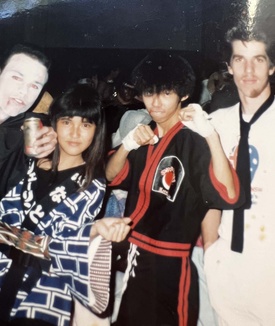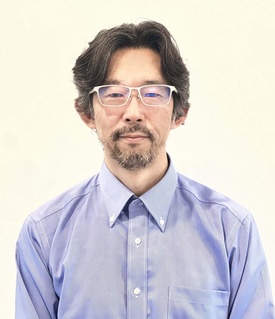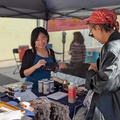Experience the class-based society of America
I have interviewed many new immigrants who have left Japan for the United States and are now working here. Immigration lawyer Tomita, with whom I had the opportunity to interview, has a unique reason for coming to the United States. Tomita is the representative of Tomita Law Firm, which is always mentioned as a firm in Los Angeles that has Japanese-speaking lawyers. One would think that he came to America with the dream of "becoming a lawyer," but he says that the reason he decided to study abroad was "to become a truck driver."
"My parents' house was in Osaka, and they ran a factory that made amulets to be placed in temples. We had no connections with America, but my father, who was fascinated by America, would listen to English conversation tapes at home and study. As for myself, what prompted me to go to America was seeing 'Convoy,' an American movie about truck drivers, when I was in middle school. I went on to high school, but it was an all-boys school (laughs), and I began to think that there was nothing good in staying there. So when I saw an exchange program notice posted up at my school, I talked to my family about it and decided to study abroad at a high school in Utah."
In Salt Lake City, Utah, he stayed with a white Mormon family for a year. After returning to Japan, he was left with a feeling of dissatisfaction with America, so he dropped out of high school in Japan and went back to study abroad in Florida.
"In Florida, I stayed with a Cuban immigrant family and my high school was mostly Cubans and blacks, so it was my first experience of the class-based side of America. The poor had a hard time making ends meet and were discriminated against, and I felt that no matter how you looked at it, skin color was related to (poverty). Lunch wasn't free back then like it is in California today, and most of my friends didn't eat lunch."
Minorities can become lawyers
After experiencing the multifaceted side of America, he returned to Japan after graduating from high school, but in 1980, an American high school diploma was considered a junior high school diploma in Japan, making it difficult to find a job and limiting his career options. So Tomita studied abroad at a junior college in Northern California for the third time, where he met an assistant professor of philosophy that would change his future.
"The teacher also talked about the persecution of Jews, and argued that it would be better for minorities to become lawyers in America. He also told me, 'A foreigner like you should become a lawyer in America,' so although I wondered whether I could really do it, I felt like giving it a try."

So Tomita went on to Boston University, majoring in philosophy and political science, and after graduating, he tried to get into law school but failed, so he went on to graduate school at Claremont University. He then got a job at a law firm in Los Angeles, where he worked while continuing his graduate studies, but was laid off after two and a half years. He then moved to a friend's television company, where he passed the law school exam while working, and continued to work during the day and attend law school at night, aiming to become a lawyer. He passed the exam and became a lawyer at the age of 31.
"In America, unlike in Japan, it's not like you just keep up with the pace of everyone around you. In America, you have to decide your own path and take full responsibility for it. However, I came to America in my second year of high school, and I learned here that in order to open up a path for yourself, you have to work many times harder than others. I think that my personality was formed in America, so to speak."
Separate the garage into an office
Tomita, who began his career as a lawyer at a firm run by a Japanese-American lawyer, reached a turning point at the age of 35.
"I became independent in 2001, but actually I didn't do it with the intention of going independent. The partner of the law firm I was working for at the time was retiring and the firm was being dissolved. Our first son was born in December of the previous year, and my wife had just quit her job as an accountant at an accounting firm to raise our child. The firm was dissolved shortly after that, and to be honest, I didn't have time to look for another job. So I opened Tomita Law Offices in the garage of our home. We didn't have the money to rent an office, so we were really just running on our feet at the time. It was four years later that we were able to rent an office. I ran the firm by myself for the first three years, but during the last year that we were operating out of the garage, a friend's wife started helping me. She was our first employee and still works for us today."
My dream is still to drive a truck across the continent
We asked Mr. Tomita, an immigration lawyer who handles immigration visas for corporations and individuals, about his motto as a lawyer.
"As I am an immigrant myself, I don't just deal with legal matters and procedures, but always keep my client's lives in mind when I work. Currently, I mainly handle visa applications for expatriates of Japanese companies, but when I started up my office over 20 years ago, I had many Japanese clients studying abroad, and I worried every day that if their application was not approved, they would have to return to Japan and whether they would be able to find work in Japan. For that reason, I have made it my motto to do everything I can. Even now, there are cases where the children of expatriates are more native English than Japanese, and I worry about whether they will be able to adapt to life in Japan when their parents return to Japan. For that reason, I try to provide comprehensive advice, including options for becoming a student in the United States and options for obtaining a work visa. This is just one example, but I believe that as a lawyer (who has lived in the United States as an immigrant) I can give more personal advice than an American lawyer who does not know the society and lives of immigrants."
Finally, when I asked him about his vision for the future, I got an unexpected answer.
"I was lucky enough to have lawyer Higa (Eriko Higa), who is 20 years younger than me, join me in the business, so I support her vision. Now that my children are older and I have more time on my hands, I plan to try to get a large truck license. In the current timeline, self-driving trucks should be appearing, so I would like to buy one and travel across the United States. I'm already excited about it."
More than 40 years have passed since Tomita moved to the United States with the dream of becoming a truck driver traveling across the American continent, and after supporting many Japanese people as a lawyer, he is now on the verge of achieving his first dream.
Tomita Law Office: Website
© 2023 Keiko Fukuda






